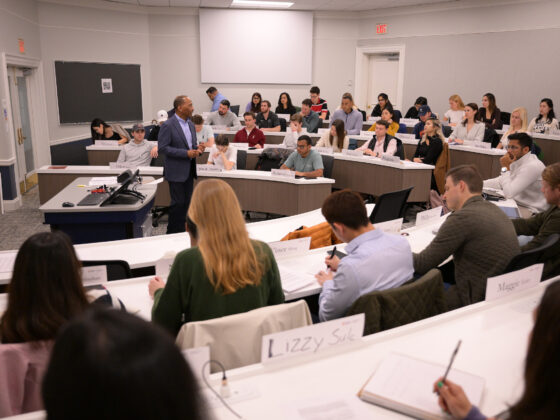In late January, Darden Professor, Morela Hernandez, was quoted in a New York Times article on pay transparency, and we recently caught up with her to talk more about her research interests. Check out Morela’s answers below!
What is your research interest?
One of my primary areas of research is understanding racial bias in negotiations. My interest in this area was initially the recruitment experiences of minority applicants to corporate environments. As an undergraduate, I remember being one of only a few Hispanic women interviewing for investment banking and consulting jobs. On these interviews, I rarely saw anyone who looked like me, which got me thinking about different strategies that companies could take to support and foster diversity.
Surprisingly, there is a general lack of knowledge about how race shapes negotiation experiences. There is a lot we know about gender and negotiation, but very little empirical evidence exists to inform how companies can think about racial bias and negotiation. I hope my work in this area can help guide the actions and steps companies can take to promote and foster cultures that value diversity and champion inclusivity.
How has your work evolved?
I have been doing research on racial bias since the late 90’s. My initial research focused on the role of demographic characteristics in various work processes (hiring, recruitment, training, promotion) which led to a curiosity about the leaders who create those processes and structures, as well as the motivations leaders have to design more inclusive practices.
How leaders display a sense of responsibility for their decisions has significant long-term consequences. Diversity and inclusion practices have outcomes that reach beyond the organizational boundaries to the society in which the organization exists. Yet, for these benefits to be realized, it’s critical that managers look beyond their short-term interests and goals. As a leader, how do you get people to care enough about this specific issue in the short-term to achieve longer-term benefits? I find this process fascinating; it’s at the heart of my current work.
As a leader, how does one get people to “care enough”?
At an organizational level, is there a compelling ethos to which individuals relate, something that taps into these individuals’ sense of purpose? This is, of course, an important question, which is often put aside when individuals are considering initial career choices. For employee satisfaction, it’s critical that someone’s work be beneficial or aligned to their value system. There has to be balance between transactional elements and feeling like you are making a positive difference.
The second organizational factor, beyond an ethos you believe in, is whether an organization invests in their people. Organizations that foster a sense of responsibility and focus on the long term will typically invest in training and development. These kinds of educational opportunities are typically a good indicator of a company’s intentions and how they view their individual employees.
At the level of teams and department units, there are two primary considerations. The first is goals for individual departments. When priorities are clear and people are involved in understanding trade-offs of decisions, employees are more willing to make short-term sacrifices for long-term benefits. The other concern is much less cognitive and much more emotional/affective – Do people feel tied to the group they are working with? Are they proud to be publicly associated with their company?
At the individual level, you can gauge the degree to which employees feel accountable to the organization just by listening to the language—how they talk about their work, their company. Is this person internalizing their individual role in creating success for the organization?
What are you working on?
Where do I begin? So many different things, but one project of interest, which I’m working on with my faculty colleagues and our PhD students, is how entrepreneurs are evaluated by Venture Capital (VC) firms. Experienced investors often talk about using their gut instincts in evaluating a potential CEO – which is, of course, rife with problems. We’re looking at the current approaches across a number of different industries, and evaluating avenues for organizations that are interested in using new technological approaches (AI, etc.) to de-bias decisions.





